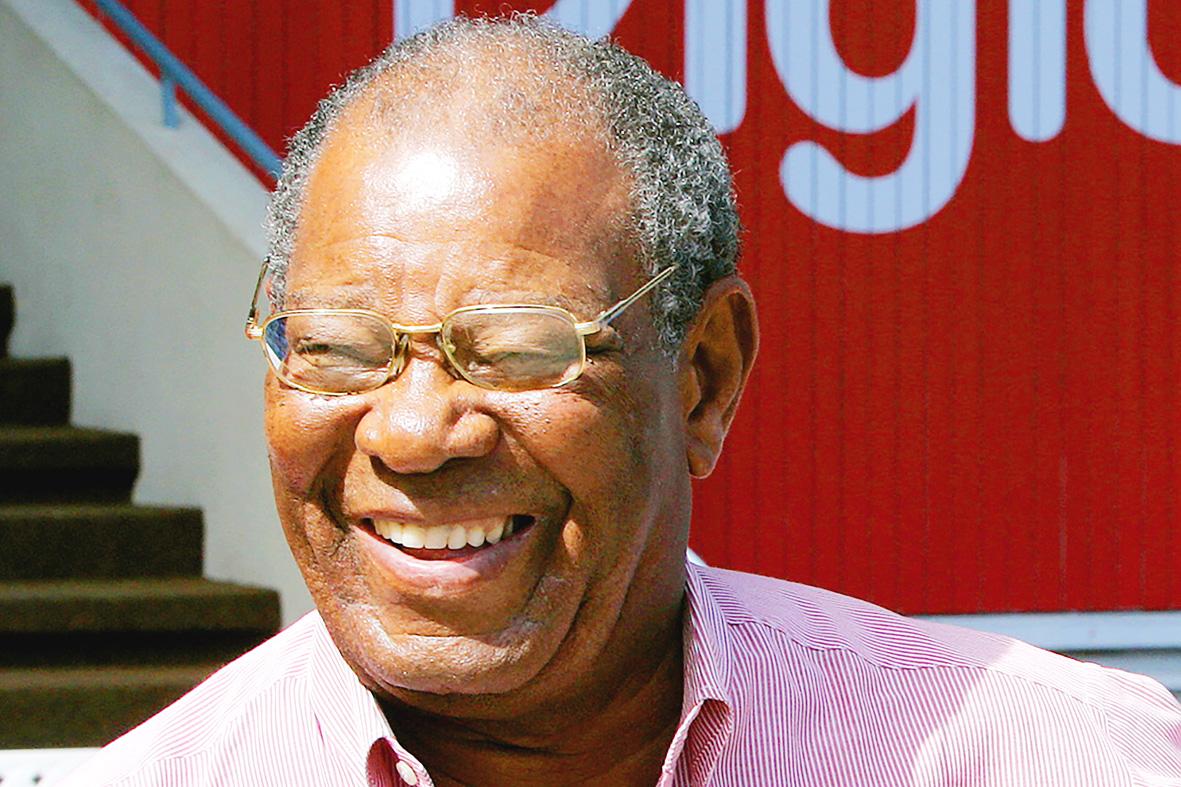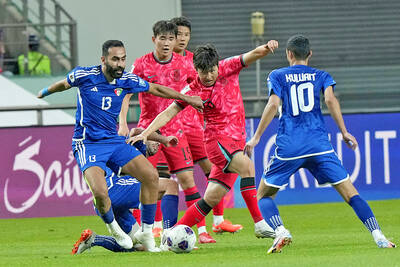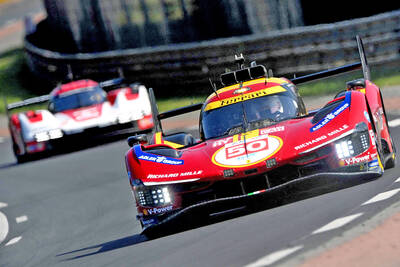Legendary batsman Everton Weekes, the last of the famed West Indies “Three Ws,” died on Wednesday at the age of 95 and was hailed as “a founding father” of the sport in the Caribbean.
“Our hearts are heavy as we mourn the loss of an icon. A legend, our hero, Sir Everton Weekes,” Cricket West Indies (CWI) wrote on Twitter. “Our condolences go out to his family, friends and many fans around the world. May he rest in peace.”
Barbadian Weekes was part of a feared post-World War II West Indies team who also featured Clyde Walcott and Frank Worrell.

Photo: AP
Walcott died in 2006, while Worrell passed away in 1967.
All three had been born within 2km of each other over an 18-month period.
Today, the national stadium in Bridgetown is named the Three Ws Oval.
Weekes played 48 Tests between 1948 and 1958, scoring 4,455 runs at an average of 58.61. His highest Test score was 207.
“A most amazing pioneer in West Indies cricket,” CWI president Ricky Skerritt said. “A tremendous gentleman and a wonderful human being. He was literally a founding father of our cricket. May he rest in peace.”
Skerritt hailed Weekes’ “amazing legacy as both a great cricketer and a great human being. He was the last of the famous three Ws to pass to the great beyond.”
“I had a personal relationship with Sir Everton,” Skerrit said. “I had the opportunity last year to go to visit him at his home in Barbados when he had come out of hospital after he had had a very serious illness. We had a chance to chat about his career. He was a most amazing man and just one of the most humble and decent and wonderful people you could ever meet.”
Weekes, who last year had a heart attack, made 15 centuries, including five in an extraordinary sequence that remains a record today.
Former West Indies captain Jeffrey Stollmeyer described Weekes as “a five-foot, six-inch [167.64cm] bundle of muscle.”
Weekes in 1948 made his mark in the fourth Test against England in Jamaica, where he crashed an attack that included Gubby Allen, Maurice Tremlett and Jim Laker for 141, leading to a 10-wicket win.
When the West Indies went on to tour India later in the year, he produced successive innings of 128 in Delhi, 194 in Bombay, and 162 and 101 in Calcutta.
He ought to have had a sixth consecutive hundred, but was run out for 90 in Madras, a decision that Walcott described as “rather doubtful.”
In 1950, he played a key supporting role to spinners Sonny Ramadhin and Alf Valentine in West Indies’ 3-1 series win in England. He made three half-centuries and then 129 at Trent Bridge.
Weekes returned to England in 1957, which produced one truly memorable innings. It came in the second innings at Lord’s with the West Indies, still trailing England by 217, on 80-4 and facing a heavy defeat.
The England attack of Fred Trueman, Brian Statham and Trevor Bailey exploited the ridge at the Nursery End to make the ball rear spitefully.
Weekes joined Garry Sobers and set about adding 100 in 95 minutes.
Weekes took a blow to the hand that cracked a finger, but in a three-hour stay at the crease, continued to carve the bowlers around Lord’s, hitting 16 boundaries before being dismissed for 90.
It was that spirit and stylish devastation that fans remembered on Wednesday.
The West Indies Players’ Association wrote on Twitter: “We salute a great West Indies icon; Sir Everton made an invaluable contribution to the sport, his country and the region. We were blessed to have him among us.”
The Marylebone Cricket Club (MCC) added: “Everyone at MCC and Lord’s are saddened at the news of Sir Everton Weekes’ passing. He will forever be remembered as one of West Indies cricket’s finest cricketers.”
“I had the great privilege of spending time in the company of Sir Everton on several occasions over the past two decades,” retired West Indies fast bowler Ian Bishop wrote on Twitter. “Never once did I leave his presence without feeling a sense of warmth, cheerfulness & having learnt something rich & endearing each time. A truly great human being.”

Brazil has four teams, more than any other country, in the expanded Club World Cup that kicked off yesterday in the US, but for SE Palmeiras, the competition holds a special meaning: winning it would provide some redemption. Under coach Abel Ferreira since 2020, Palmeiras lifted two Copa Libertadores titles, plus Brazilian league, cup and state championships. Even before Ferreira, it boasted another South American crown and 11 league titles. The only major trophy missing is a world champions’ title. Other Brazilian clubs like Fluminense FC and Botafogo FR, also in the tournament, have never won it either, but the problem for Palmeiras

Paris Saint-Germain’s Lee Kang-in has pleaded with South Korea fans to get behind the team at the 2026 FIFA World Cup after more boos were aimed at coach Hong Myung-bo despite leading them to qualification. South Korea reached next year’s finals in North America without losing a game, but that does not tell the whole story. The country’s soccer association has been in the firing line, having scrambled about to find a successor after sacking the unpopular Jurgen Klinsmann in February last year. They eventually settled on Hong, the decorated former skipper who had an unsuccessful stint as coach in 2013-2014, during which

Lionel Messi drew vast crowds and showed flashes of his brilliance when his Inter Miami side were held to a goalless draw by African giants Al-Ahly as the revamped FIFA Club World Cup got off to a festive start on Saturday. Fans showed up en masse for the Group A clash at the Hard Rock Stadium, home to the NFL’s Miami Dolphins, but Messi could not fully deliver, his best chance coming through a last-second attempt that was deflected onto the crossbar. Inter Miami next face FC Porto on Thursday in Atlanta, while Al-Ahly, who benefited from raucous, massive support, are to

Ferrari’s F1 fortunes might be flagging, but the Italian team start this weekend’s 24 Hours of Le Mans as favorites, targeting a third consecutive triumph in motorsport’s fabled endurance classic. Roger Federer is acting as celebrity starter with the tennis icon getting the 93rd edition of the jewel in four-wheeled endurance racing’s crown under way tomorrow. Twenty-four hours later, through daylight, darkness and dawn, the 21 elite hypercars are to battle it out over 300 laps (more than 4,000km) in front of a sold-out 320,000 crowd burning the midnight oil with copious quantities of coffee and beer. Ferrari made a triumphant return after